ESG & CSR case study for Plastic Packaging Based Industries
Case Study: Solid Waste and Plastic Waste Management Program by Earth5R (2015-2023)
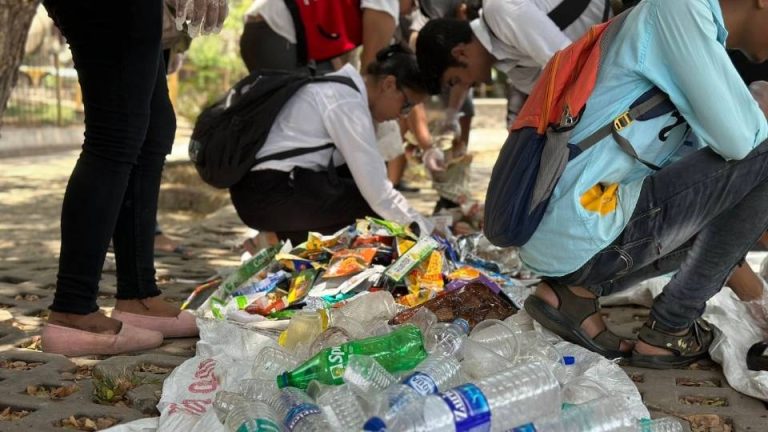
INTRODUCTION
From 2015 to 2023, Earth5R initiated a large-scale solid waste management program focused on waste segregation, particularly the management of plastic waste. With the participation of an average of 10,000 citizens each year, the program focused on preventing recyclable waste from going to landfills and instead promoting proper segregation and recycling practices. This initiative aligns with the growing need for companies engaged in plastic packaging to reduce their environmental footprint and improve sustainability practices across their supply chains.
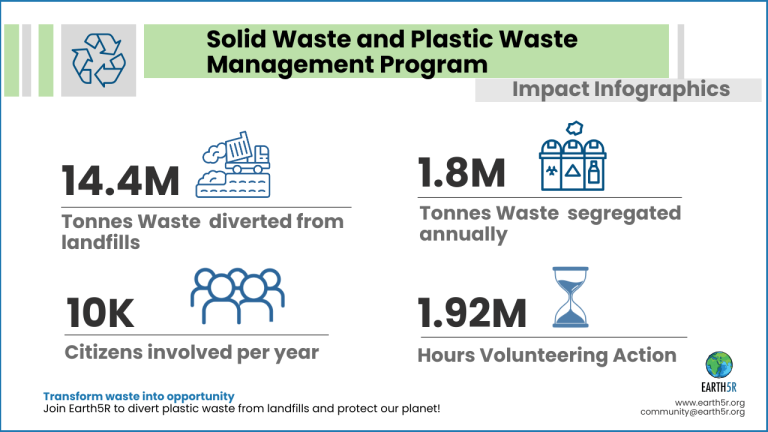
THE PROBLEM STATEMENT
Plastic waste, if not properly segregated, often ends up in landfills or oceans, where it takes hundreds of years to decompose. As plastic is a major component of solid waste, companies involved in manufacturing and using plastic packaging are under increasing scrutiny to adopt responsible waste management practices. The challenge is to ensure that plastic waste is diverted from landfills, recycled effectively, and managed sustainably to reduce environmental impact.
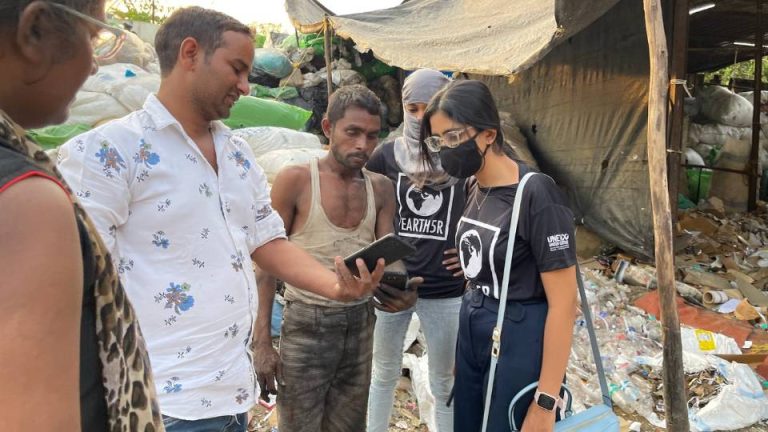
EARTH5R’S INTERVENTION & SOLUTION
- Citizen-Led Waste Segregation Program: Between 2015 and 2023, an average of 10,000 citizens participated in Earth5R’s waste segregation program each year. These citizens were trained to segregate plastic and other recyclable waste from household waste, preventing it from being mixed with organic and hazardous waste.
- Daily Waste Segregation: Each citizen segregated approximately 0.5 kg of waste per day, which amounted to around 15 kg of recyclable waste per month. The focus was primarily on dry waste, including plastic, metal, and paper, ensuring that these materials could be recycled and reused.
- Continuous Engagement and Long-Term Impact: Over the course of eight years, the citizens involved in the program significantly reduced the amount of waste sent to landfills. By promoting the importance of waste segregation and recycling, Earth5R contributed to long-term behavioural change, making waste management a regular part of community life.
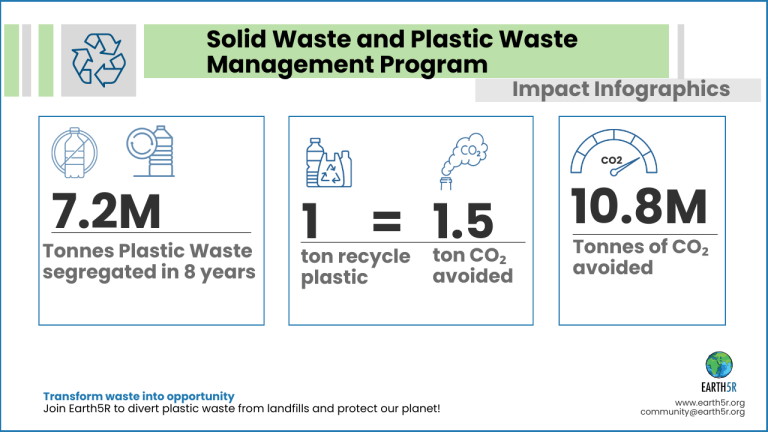
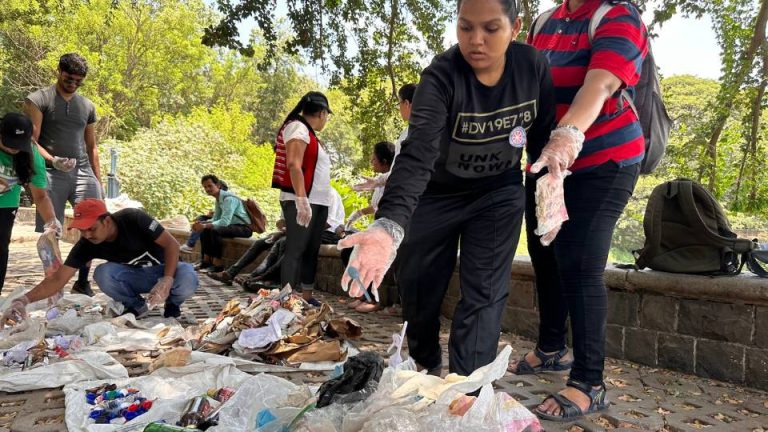
OUTCOME:
Total Waste Segregated:
- With 10,000 citizens participating each year and each segregating 15 kg of recyclable waste per month, the total waste segregated per year was: 10,000 citizens x 15 kg/month x 12 months = 1.8 million kg (1,800 tonnes) of recyclable waste per year.
- Over the eight-year period, the total waste segregated was: 1.8 million kg/year x 8 years = 14.4 million kg (14,400 tonnes) of waste diverted from landfills and recycled.
Plastic Waste Management:
Of the total waste segregated, a significant portion was plastic packaging waste. Assuming 50% of the recyclable waste was plastic, the total plastic waste managed over eight years was: 14,400 tonnes x 50% = 7,200 tonnes of plastic waste recycled.
Carbon Offset:
Recycling plastic significantly reduces carbon emissions compared to producing new plastic. On average, recycling 1 tonne of plastic can save around 1.5 tonnes of CO2 emissions. The total carbon offset from recycling 7,200 tonnes of plastic over eight years was: 7,200 tonnes of plastic x 1.5 tonnes of CO2/tonne = 10,800 tonnes of CO2 emissions avoided.
Economic Impact (Value of Recycled Materials):
The value of recycled plastic can vary, but for this case study, we assume an average value of ₹20 per kg for recyclable plastic. The total economic value of the plastic waste recycled was: 7,200 tonnes x 1,000 kg/tonne x ₹20/kg = ₹144 million (₹14.4 crores) generated from the recycled plastic.
Volunteering Hours:
Each citizen contributed an average of 2 hours per month to segregate waste and manage recycling activities. Over eight years, the total number of volunteer hours was: 10,000 citizens x 2 hours/month x 12 months/year x 8 years = 1,920,000 volunteer hours.
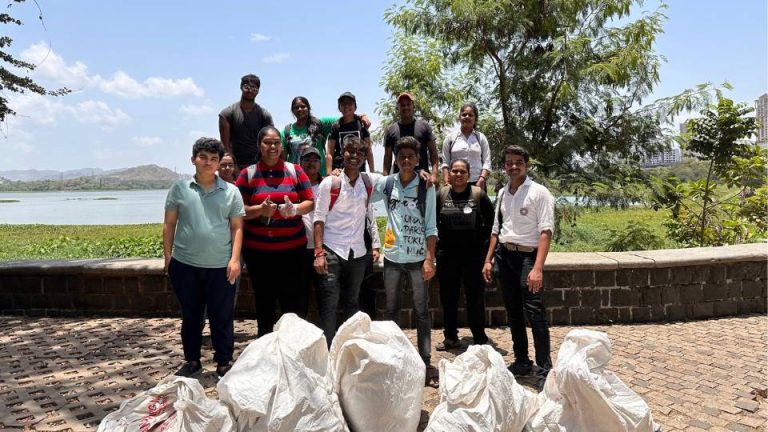
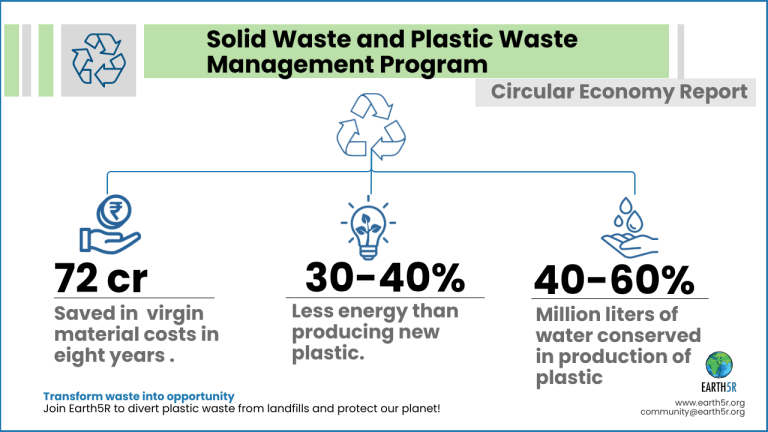
ESG KPI’s
Environmental Impact:
- Waste Recycled: 14,400 tonnes of recyclable waste diverted from landfills, including 7,200 tonnes of plastic waste.
- Carbon Offset: 10,800 tonnes of CO2 emissions avoided through plastic recycling efforts.
- Pollution Reduction: By preventing plastic waste from reaching landfills or oceans, the program significantly reduced environmental pollution and plastic contamination in natural ecosystems.
Social Impact:
- 1.92 million volunteer hours contributed by engaged citizens, creating a sense of community ownership and responsibility towards waste management.
- Behavioral Change: The continuous education and engagement of citizens led to a lasting impact on their waste management practices, promoting sustainable living and recycling within their communities.
Economic Impact:
- ₹14.4 crores generated from recycling plastic waste, creating economic value from waste materials and supporting the recycling industry.
- Circular Economy: The program contributed to the development of a circular economy by reintroducing valuable materials like plastic into the production cycle, reducing the need for virgin materials.
Governance Impact:
- Compliance with Sustainability Goals: Companies involved in plastic packaging can leverage this case study to align with sustainability and ESG goals, demonstrating their commitment to responsible waste management.
- Regulatory Compliance: By partnering with Earth5R’s waste segregation programs, companies can showcase their alignment with government regulations on waste management and recycling, fulfilling corporate social responsibility (CSR) mandates.
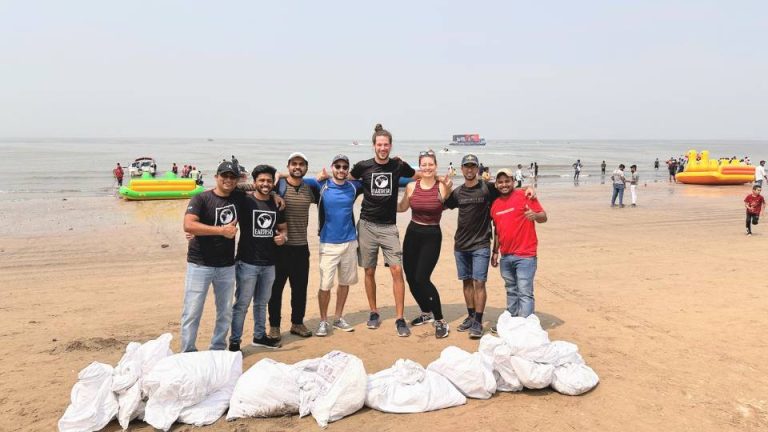
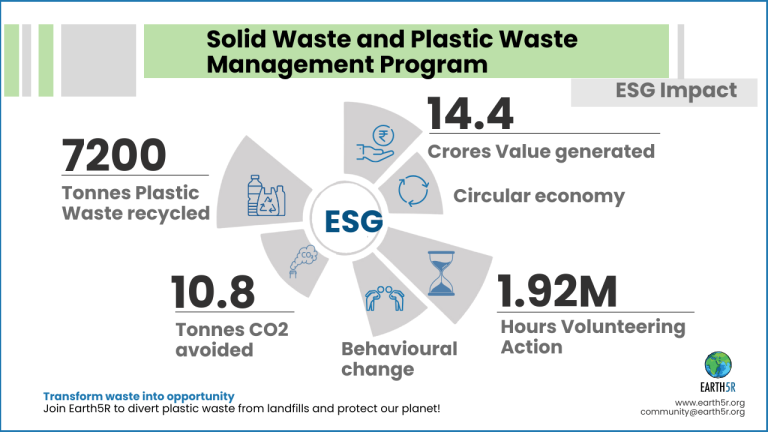
IMPACT ON COMPANIES USING PLASTIC PACKAGING
Companies engaged in plastic packaging, such as food and beverage manufacturers, can benefit from participating in or supporting similar waste management initiatives. By investing in or collaborating with Earth5R’s programs, these companies can reduce their environmental footprint, enhance their ESG performance, and demonstrate leadership in responsible plastic waste management. This partnership can also contribute to fulfilling corporate sustainability goals, such as reducing plastic waste and improving recycling rates.
THE ROAD AHEAD
Given the success of the program, Earth5R plans to expand its waste segregation and recycling efforts to more cities and communities, engaging a larger number of citizens and corporates. By scaling up this initiative, Earth5R aims to prevent even more plastic waste from reaching landfills, while continuing to educate citizens about the importance of recycling and sustainability.
Case Study 2
ESG & CSR Case Study: Waste Segregation and Plastic Waste Collection Program with Earth5R
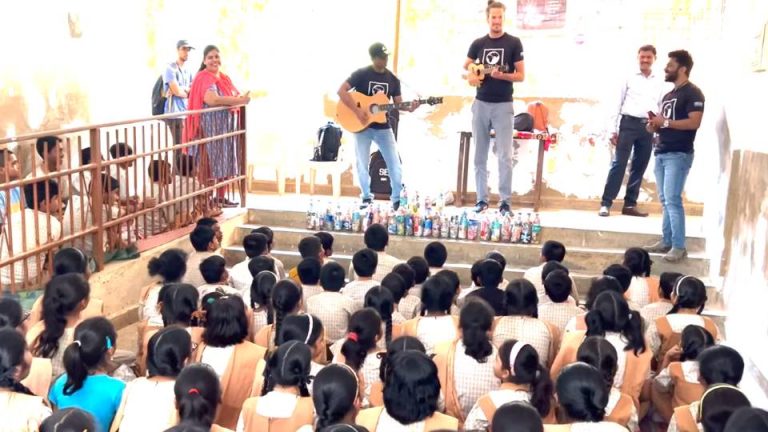
INTRODUCTION
Plastic waste, especially small pieces such as multi-layer packaging, has become a significant environmental challenge in urban ecosystems. These plastics often end up in gutters, public spaces, and waste hotspots, eventually breaking down into microplastics that are difficult to recover and harmful to the environment. To tackle this issue, Earth5R partnered with a leading company to conduct a large-scale awareness and waste segregation program in key metro cities across India. The goal was to teach citizens the importance of proper waste segregation to prevent plastic waste from reaching landfills and public areas, and to promote recycling.
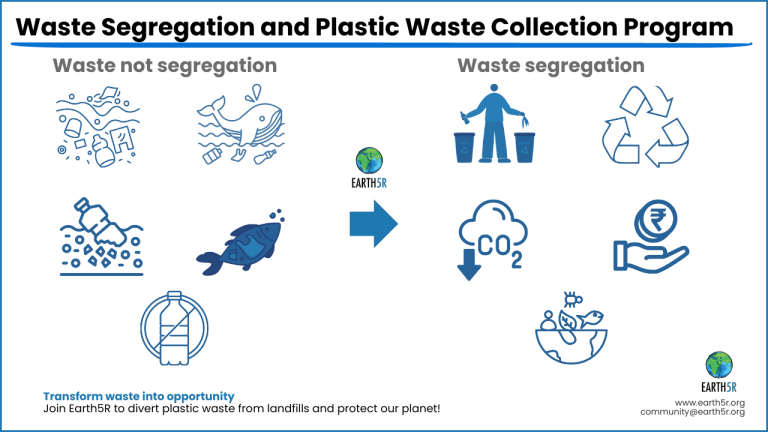
THE PROBLEM STATEMENT
Plastic waste, when mixed with organic or wet waste, becomes nearly impossible to recycle. Without proper segregation, plastics accumulate in public spaces and waterways, breaking down into microplastics that enter ecosystems, the ocean, and ultimately the food chain. The challenge was to create widespread awareness and behavior change around waste segregation, ensuring that plastic waste could be collected and recycled before it became an environmental hazard.
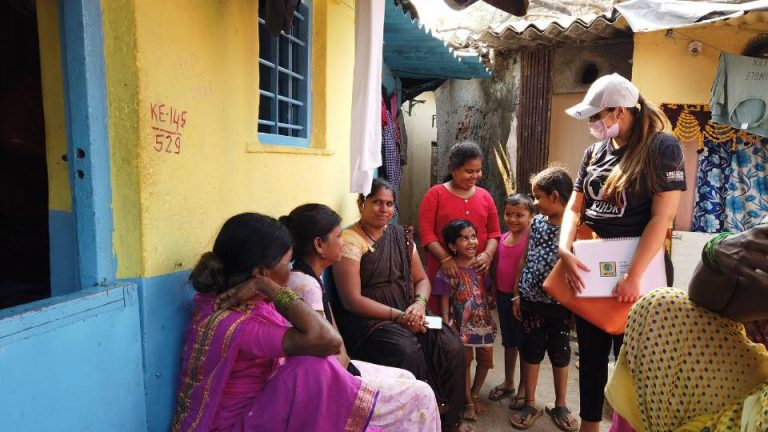
EARTH5R’S INTERVENTION & SOLUTION
Earth5R designed and implemented a comprehensive awareness and waste segregation program in collaboration with the company, targeting schools, colleges, residential complexes, and local communities:
Training Citizens on Recycling Plastic Waste Providing Container for collecting Plastic Waste
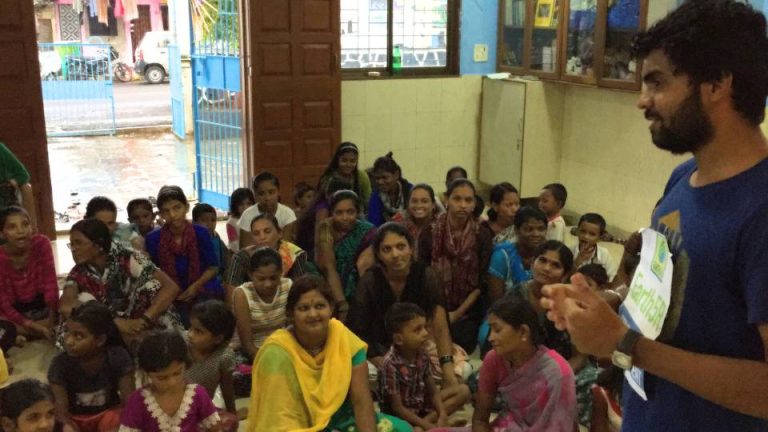
- Behavioral Change and Community Engagement: Earth5R encouraged community members to pledge to segregate their plastic waste and provided practical guidance on how to separate plastics from wet and organic waste. These efforts helped create long-lasting behavioral changes within communities, with citizens committing to proper waste management practices.
- Plastic Collection and Recycling Program: Following the awareness campaign, Earth5R launched a plastic collection drive across the residential buildings involved. Citizens were encouraged to segregate and collect small plastic waste and multi-layer packaging, which was then sent for recycling or pyrolysis, depending on the suitability of the process.
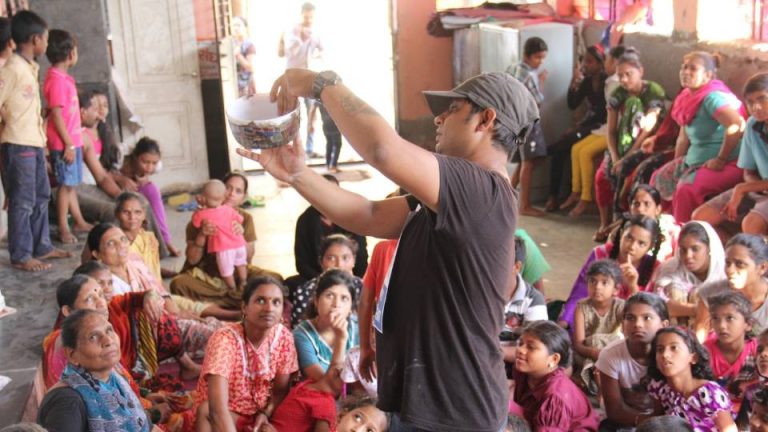
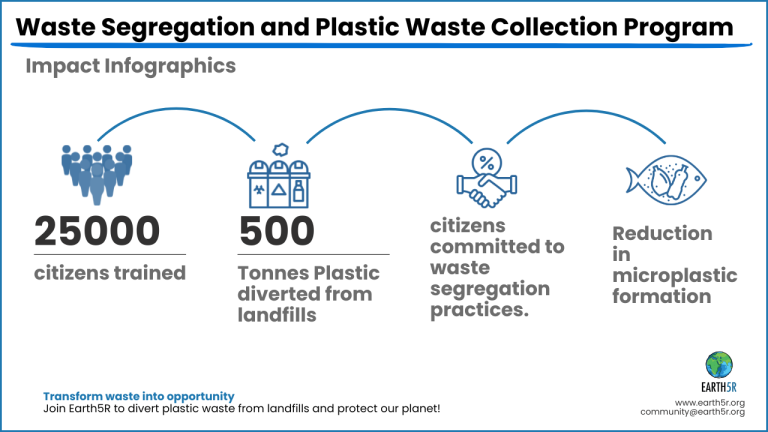
OUTCOME
- Waste Collected and Diverted from Landfills:
Earth5R was able to collect 500 tons of plastic waste from the participating buildings, successfully diverting it from landfills. This waste was either sent to recycling centers or used for pyrolysis, preventing it from becoming an environmental hazard.
- Citizens Trained:
The program trained over 25,000 citizens, equipping them with the knowledge and tools to properly segregate their waste. This resulted in a widespread change in how communities approached waste management, with many vowing to continue proper segregation practices in the future.
- Reduction in Microplastic Formation:
By ensuring that plastic waste was properly segregated and sent for recycling, Earth5R helped prevent large amounts of plastic from breaking down into microplastics. This initiative contributed to reducing plastic pollution in public spaces, waterways, and ecosystems.
- Behavioral Shift:
The program led to a significant shift in the way communities treated plastic waste. Citizens became more mindful of their consumption and disposal habits, understanding that segregation is key to reducing plastic waste’s impact on the environment.
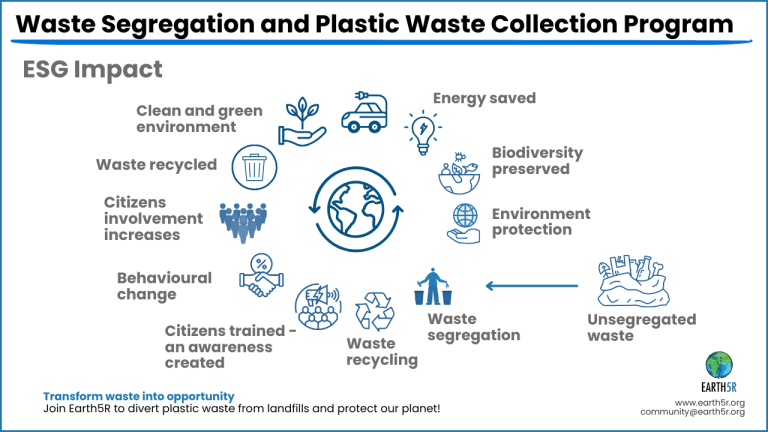
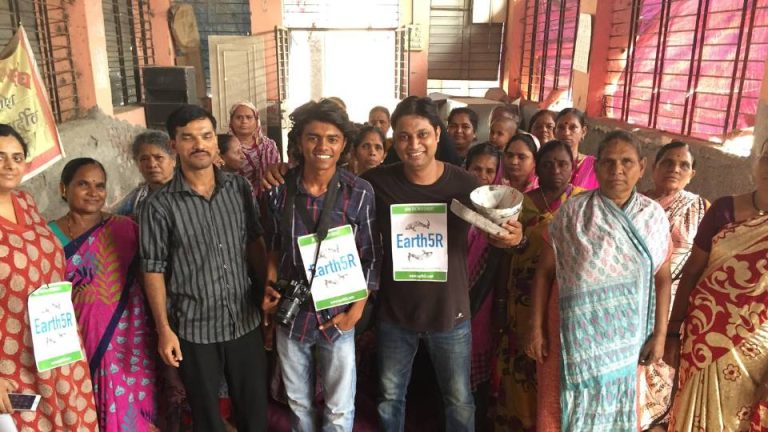
THE ROAD AHEAD
Earth5R plans to expand this waste segregation and plastic collection program to other cities and regions, continuing to educate citizens and promote sustainable waste management practices. By scaling up this initiative, Earth5R and its partners aim to create a larger impact by diverting more plastic waste from landfills and preventing further environmental degradation.
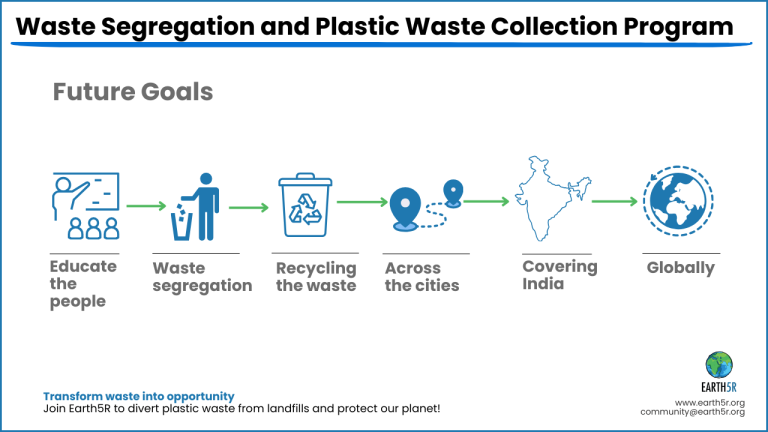
About Earth5R
Earth5R is an ESG and CSR “Action” platform that drives real-world environmental initiatives, empowering communities to take meaningful action. Through its innovative programs, Earth5R helps companies and individuals create positive environmental and social impact by promoting sustainability, circular economy principles, and community engagement.
